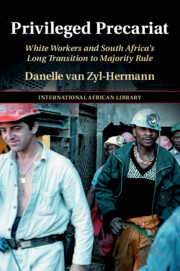Book contents
- Privileged Precariat
- The International African Library
- Privileged Precariat
- Copyright page
- Dedication
- Contents
- Table and figures
- Acknowledgements
- Abbreviations and acronyms
- Introduction
- Part I White workers and the racial state
- Part II White workers and civil society mobilisation
- 4 From trade union to social movement
- 5 An ‘alternative government’
- 6 Discursive labour and strategic contradiction
- 7 ‘Guys like us are left to our own mercy’
- Conclusion
- Bibliography
- General titles
- Newspapers and online sources
- Index
- Series page
7 - ‘Guys like us are left to our own mercy’
Counternarratives, ambivalence, and the pressures of racial gatekeeping among Solidarity’s blue-collar members
from Part II - White workers and civil society mobilisation
Published online by Cambridge University Press: 17 April 2021
- Privileged Precariat
- The International African Library
- Privileged Precariat
- Copyright page
- Dedication
- Contents
- Table and figures
- Acknowledgements
- Abbreviations and acronyms
- Introduction
- Part I White workers and the racial state
- Part II White workers and civil society mobilisation
- 4 From trade union to social movement
- 5 An ‘alternative government’
- 6 Discursive labour and strategic contradiction
- 7 ‘Guys like us are left to our own mercy’
- Conclusion
- Bibliography
- General titles
- Newspapers and online sources
- Index
- Series page
Summary
This chapter returns to white workers’ voices. Drawing on interviews with men who entered blue-collar work and joined the MWU before or during the Wiehahn reforms, it demonstrates the persistence of proud working-class identification, the presence of deep ambivalence around race and whiteness, and working-class resentment towards wealthy Afrikaners. This contradicts the simplistic racial tropes, naturalisation of ethnic identity, and denial of class in the Solidarity Movement’s official framing. At the same time, the union veterans display deep commitment to the Movement and its ideals in the face of the loss of past certainties, perceptions of social decline, personal vulnerability, and anxiety about the future they perceive. This sees them subjected to pressure from the leadership to manage Solidarity’s race- and culture-based membership on the ground. Together, the men’s counternarratives, ambivalences, and vulnerabilities demonstrate the specificity of blue-collar subjectivities and workplace experiences. In this way, the testimonies presented in this chapter expose the persistent reality of class otherwise not readily visible within the white, Afrikaner population, and provide striking insight into how white workers experienced and sought to negotiate the demise of the racial state.
- Type
- Chapter
- Information
- Privileged PrecariatWhite Workers and South Africa's Long Transition to Majority Rule, pp. 264 - 302Publisher: Cambridge University PressPrint publication year: 2021

